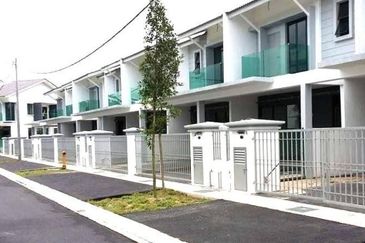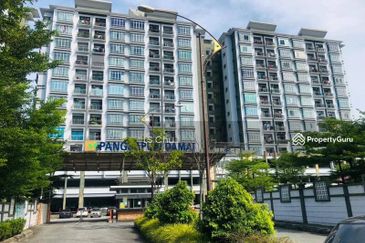KUALA LUMPUR: The property sector is highly unlikely to get more incentives under the Budget 2010 proposals to be unveiled on Friday, as the earlier incentives had been given out in the past two Budgets and stimulus packages.
Kenanga Investment Research said on Wednesday, Oct 21 it was expecting a rather quiet Budget for the sector and most property companies had weathered the financial storm well due to their healthier balance sheets compared with the 1997-98 Asian financial crisis.
It noted that many developers had undertaken promotional programmes such as the 5/95 home loan scheme to attract buying interest during the lull period in the second half of last year to the first half of this year.
"The sector's resilience (due to developer's nimbleness and buyer's high savings rate), ample liquidity in the system and low interest rates is naturally conducive for the sector.
"Hence the government will probably dish-out incentives to other sectors, especially when its resources are stretched by the recent stimulus packages and mini budgets," it said.
Kenanga Research also said out of the eight wishes expressed by the Real Estate and Housing Developers Association Malaysia (REHDA) recently, six of the wishes were unlikely to be met while there was a likelihood of a variation to other proposals.
On REHDA's proposals that if project reaches 50% completion, unsold Bumiputra units should be automatically release for public sale, the research house said the proposal was "highly unlikely".
"But there may be a variation incentive given (for example. maybe at higher completion levels or a few months post project completion), allowing developers to sell unsold Bumiputra units more quickly," it said.
Kenanga Research also said REHDA's proposal that monthly withdrawal from the Employees Provident Fund (EPF) for a second home ownership and higher housing loan facilities for civil servants was likely but with a variation.
The research house said the property sector was in a healthier position compared with other sectors (for example manufacturing). Most developers were financially sound whilst being able to offer a myriad of promotions.
It added banks were more than willing to participate in interest absorption schemes as interest rates remains low, whilst Malaysian's are cashed-up/have high savings rate. Hence, ownership of second homes was easily accessible without the government's aid.
"We do not think the government will allow for EPF withdrawals on second homes, as it promotes speculative activities which may affect the owner-occupancy markets and/or make homes less affordable. If anything, the government may increase the monthly withdrawal amounts for repayments of one home," it said.
However, Kenanga Research said the other six REHDA proposals were unlikely to be considered in the Budget. The proposals included relaxing Bumiputra quotas; RM10,000 grant for first -time house buyers and a proposed waiver/ reduction of stamp duty for residential properties less than RM250,000 and related loan agreements plus transfer/sales and purchase agreement of properties.
Kenanga Investment Research said on Wednesday, Oct 21 it was expecting a rather quiet Budget for the sector and most property companies had weathered the financial storm well due to their healthier balance sheets compared with the 1997-98 Asian financial crisis.
It noted that many developers had undertaken promotional programmes such as the 5/95 home loan scheme to attract buying interest during the lull period in the second half of last year to the first half of this year.
"The sector's resilience (due to developer's nimbleness and buyer's high savings rate), ample liquidity in the system and low interest rates is naturally conducive for the sector.
"Hence the government will probably dish-out incentives to other sectors, especially when its resources are stretched by the recent stimulus packages and mini budgets," it said.
Kenanga Research also said out of the eight wishes expressed by the Real Estate and Housing Developers Association Malaysia (REHDA) recently, six of the wishes were unlikely to be met while there was a likelihood of a variation to other proposals.
On REHDA's proposals that if project reaches 50% completion, unsold Bumiputra units should be automatically release for public sale, the research house said the proposal was "highly unlikely".
"But there may be a variation incentive given (for example. maybe at higher completion levels or a few months post project completion), allowing developers to sell unsold Bumiputra units more quickly," it said.
Kenanga Research also said REHDA's proposal that monthly withdrawal from the Employees Provident Fund (EPF) for a second home ownership and higher housing loan facilities for civil servants was likely but with a variation.
The research house said the property sector was in a healthier position compared with other sectors (for example manufacturing). Most developers were financially sound whilst being able to offer a myriad of promotions.
It added banks were more than willing to participate in interest absorption schemes as interest rates remains low, whilst Malaysian's are cashed-up/have high savings rate. Hence, ownership of second homes was easily accessible without the government's aid.
"We do not think the government will allow for EPF withdrawals on second homes, as it promotes speculative activities which may affect the owner-occupancy markets and/or make homes less affordable. If anything, the government may increase the monthly withdrawal amounts for repayments of one home," it said.
However, Kenanga Research said the other six REHDA proposals were unlikely to be considered in the Budget. The proposals included relaxing Bumiputra quotas; RM10,000 grant for first -time house buyers and a proposed waiver/ reduction of stamp duty for residential properties less than RM250,000 and related loan agreements plus transfer/sales and purchase agreement of properties.
SHARE
TOP PICKS BY EDGEPROP
RENT
FEATURED

Lake Vista Residence (Tasik Vista Residen)
Cheras, Selangor
RM 1,950
3 beds |
2 bath |
1200 sqft
SALE
FEATURED

Lake Vista Residence (Tasik Vista Residen)
Cheras, Selangor
RM 556,650
3 beds |
2 bath |
1200 sqft
SALE
FEATURED

Taman Bukit Rahman Putra
Sungai Buloh, Selangor
RM 849,000
5 beds |
4 bath |
2000 sqft
SALE
FEATURED

Botania Residence, Saujana Rawang
Rawang, Selangor
RM 500,000
4 beds |
3 bath |
2250 sqft
SALE
FEATURED

Jalan Setia Permai U13/42F
Setia Alam/Alam Nusantara, Selangor
RM 1,100,000
4 beds |
3 bath |
2000 sqft
RENT
FEATURED

Periwinkle @ Bandar Rimbayu
Telok Panglima Garang, Selangor
RM 3,500
3 beds |
3 bath |
2267 sqft
SALE
FEATURED

Shamelin Star Serviced Residences
Cheras, Kuala Lumpur
RM 1,280,000
4 beds |
4 bath |
2402 sqft


















